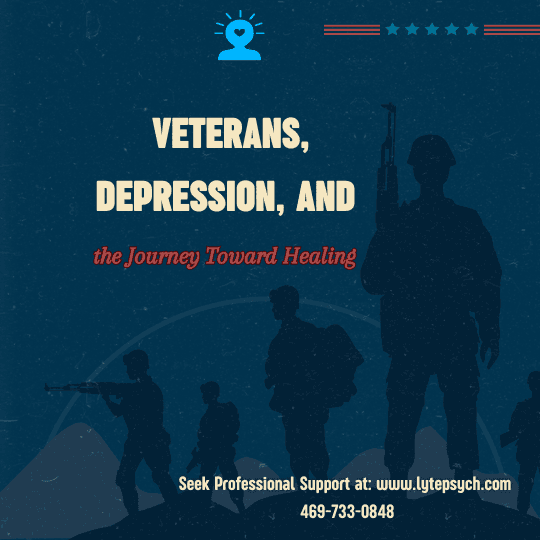Tue Nov 11 2025
Veterans, Depression, and the Journey Toward Healing at Lyte Psychiatry (Affordable Therapist and Psychiatrist Near You) Dallas & Arlington, TX

Veterans, Depression, and the Journey Toward Healing
at Lyte Psychiatry (Affordable Therapist and Psychiatrist Near You in Dallas & Arlington, TX)
The Silent Battles After Service
When a veteran returns home, the world often expects a smooth transition a return to family, routine, and peace. Yet for many, the real battle begins after service ends.
Depression in veterans is more than sadness it’s often a complex combination of emotional exhaustion, guilt, loss of identity, and unprocessed trauma.
Understanding Depression Among Veterans
Why Veterans Are at Higher Risk
Military service demands extraordinary courage and discipline, but it can also expose individuals to extreme stress, trauma, and loss. These experiences combined with the abrupt change to civilian life can disrupt emotional balance.
Common contributing factors include:
1. Combat exposure and trauma
2. Loss of structure and camaraderie after leaving service
3. Chronic pain or physical injury
4. Sleep disturbances and nightmares
5. Isolation or disconnection from family and friends
6. Survivor’s guilt or unresolved grief
Recognizing the Signs of Depression
Depression looks different for everyone especially among veterans who often minimize their emotions out of pride or training.
Emotional Signs
Persistent sadness, hopelessness, or emptiness
Irritability, guilt, or anger
Loss of interest in previously enjoyable activities
Difficulty feeling connected to others
Physical and Cognitive Signs
Changes in appetite or sleep patterns
Fatigue or low energy
Poor concentration or decision-making
Slowed movements or speech
Behavioral Signs
Withdrawal from friends or loved ones
Decline in work or academic performance
Increased alcohol or substance use
Thoughts of self-harm or suicide
If you or someone you know is in crisis, contact the Veterans Crisis Line by dialing 988 (then press 1) help is available 24/7.
The Connection Between Depression and Military Experience
Even positive transitions like reuniting with family an trigger emotional turbulence when routine, rank, and community suddenly disappear.
These experiences can lead to:
Emotional numbing (feeling detached or “shut down”)
Hyperarousal (always on edge, scanning for danger)
Negative self-beliefs (“I should have done more,” “I can’t connect with anyone”)
At Lyte Psychiatry, we understand that these reactions are not signs of weakness they are normal human responses to extraordinary circumstances.
The Healing Process: How Lyte Psychiatry Supports Veterans
Our compassionate team of psychiatrists and therapists works with veterans to build customized, evidence-based treatment plans that may include:
Cognitive Behavioral Therapy (CBT)
Eye Movement Desensitization and Reprocessing (EMDR)
Used to process traumatic memories safely, reducing emotional intensity and reactivity.
Medication Management
Mindfulness and Stress Reduction Techniques
Encourages present-moment awareness and relaxation, lowering anxiety and improving sleep.
The Path Forward: Finding Meaning After Service
Healing from depression often begins with rediscovering purpose. Many veterans find fulfillment in community service, mentoring, or creative outlets small steps that reestablish connection and self-worth.
Therapy helps veterans not only manage symptoms but also rewrite their story transforming pain into resilience and purpose.
Reclaim Strength, Purpose, and Hope at Lyte Psychiatry (Affordable Therapist and Psychiatrist Near You) Dallas & Arlington, TX
You’ve already shown incredible strength in serving others now it’s time to focus on your own healing.
Contact Lyte Psychiatry today to schedule a confidential consultation. Together, we’ll help you move forward one step, one conversation, one victory at a time.
FAQs About Veterans and Depression
Q: How do I know if what I’m feeling is depression or just stress?
A: If sadness, fatigue, or emptiness persist for more than two weeks or interfere with daily life, it may be depression rather than temporary stress.
Q: Can therapy really help veterans with depression?
A: Yes. Evidence-based therapies like CBT and EMDR are highly effective for treating depression and trauma-related symptoms.
Q: Is medication required?
A: Not always. Some veterans improve with therapy alone, while others benefit from medication as part of a holistic treatment plan. Our psychiatrists will tailor care to your needs.
Q: What if I’m not ready to talk about my experiences?
A: That’s okay. Healing doesn’t start with talking — it starts with being heard. Our clinicians provide a safe space without judgment or pressure.
Q: Does Lyte Psychiatry offer telehealth sessions?
A: Yes. Veterans can receive therapy and medication management online for convenience and privacy.